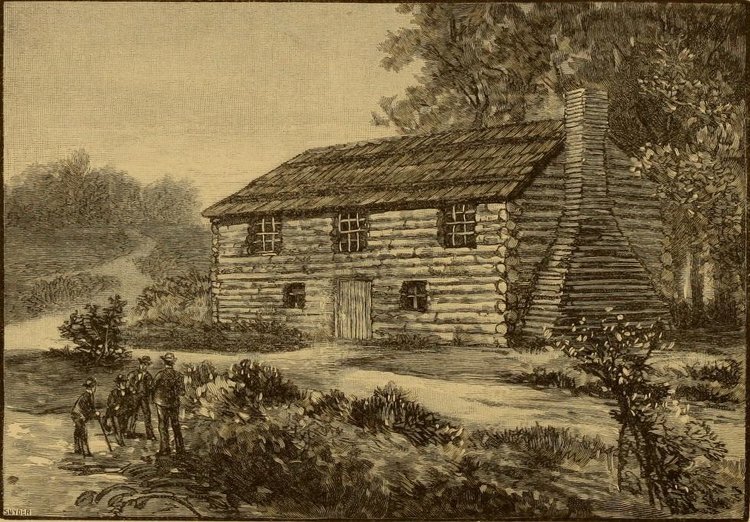(Receive our blog posts in your email by clicking here. If the author links in this post are broken, please visit our Free PDF Library and click on the author’s page directly.)
At Log College Press, we aim to survey the broad landscape of American Presbyterianism, from mainstream denominations to dissenting branches, both conservative and liberal, to provide insight into the history and claims of those who speak for Presbyterianism in America. But we have a special place in our heart for the original Log College, which served as the first Presbyterian seminary in the colonies.
A 19th-century sketch of the Log College with an interesting background described here.
Here is an effort to provide resources for further study on that Log College and specially connected to it. This is not a complete survey, but it is hoped that readers who wish to study the Log College more in-depth can do so ably with the material referenced below.
The Founders of the Log College (c. 1726) were William Tennent, Sr. (1673-1746) and Catherine Kennedy Tennent (1683-1753). Each of their male children were among the graduates of the Log College program of education: Gilbert, William, Jr., John, and Charles. Other famous Log College alumni include Samuel Blair, John Blair, Samuel Finley and Charles Beatty. The Log College planted seeds which later resulted in the founding of Princeton, the Log Colleges of John McMillan, David Caldwell and others.
There are many valuable works about the Log College and its alumni and influence available to read at Log College Press, including:
Archibald Alexander - Biographical Sketches of the Founder, and Principal Alumni of the Log College (1845) and Sermons and Essays by the Tennents and Their Contemporaries (1855)
Elijah R. Craven - The Log College of Neshaminy and Princeton University (1902)
Nathaniel Irwin - Memoirs of the Presbyterian Church of Neshaminey (1793, 1904)
Guy S. Klett and Thomas C. Pears, Jr. - Documentary History of William Tennent and the Log College (1940)
Thomas Murphy - The Presbytery of the Log College; or, The Cradle of the Presbyterian Church in America (1889)
Douglas K. Turner - History of Neshaminy Presbyterian Church of Warwick, Hartsville, Bucks County, PA, 1726-1876 (1876); Sketch of Log College (1886, 1909); and The Log College (1889)
Also of interest is Charles Spencer Richardson, Jr., A Week in Log College Country (1903), available to read here. William B. Sprague’s Annals, Richard Webster’s History of the Presbyterian Church in America, and many other biographical and historical literature is also available to read at Log College Press.
Other works known to the writer, but not yet available on Log College Press include:
George H. Ingram - The Story of the Log College (1927) and Biographies of the Alumni of the Log College (1929-1930)
Clarence E.N. Macartney - The Log College and the Beginning of Princeton (1946-1947)
Richard McIlwaine - The Influence of the Log College in the South (1889)
Thomas C. Pears, Jr. - History by Hearsay or New Light on William Tennent: A Footnote on the 'Documentary History of William Tennent (1940)
Gary E. Schnittjer - William Tennent and the Log College: A Common Man and an Uncommon Legacy (1992) and The Ingredients of Effective Mentoring: The Log College as a Model for Mentorship (1994)
Books which directly treat aspects of the Log College from the Secondary Sources page at Log College Press include:
Milton J. Coalter, Jr. - Gilbert Tennent, Son of Thunder (1986)
S. Donald Fortson III - Colonial Presbyterianism: Old Faith in a New Land (2006)
John F. Hansen - The Vision That Changed a Nation: The Legacy of William Tennent (2007)
Margaret Adair Hunter, Education in Pennsylvania Promoted by the Presbyterian Church, 1726–1837 (1937)
Alexander Leitch - A Princeton Companion (1978)
Howard Miller - The Revolutionary College: American Presbyterian Higher Education, 1707-1837 (1976)
Mary A. Tennent - Light in Darkness: The Story of William Tennent, Sr. and the Log College (1971)
There is a great deal of literature on Princeton which can be read online at Log College Press, or ordered from the Secondary Sources page, which touches on the history of the Log College. Many titles are not mentioned here, but could be included in a more thorough compilation. But it is hoped that the resources highlighted here will provide the student of colonial American Presbyterian history with readily available information to assist in their studies of a remarkable chapter of church history.
And let us remember that “the past is not dead,” because the story of the Tennents and the Log College is but prologue to the present. The William Tennent House Association continues its work in a different direction to make this history and legacy alive and accessible to visitors as well. One Log College, and the many others which followed, did so much to leave a godly legacy for America. We are glad to help others learn more about the story, and we are thankful to God for the legacy.


